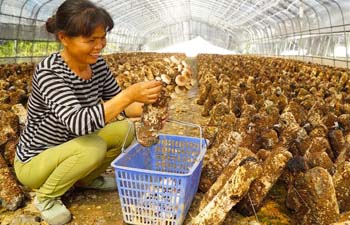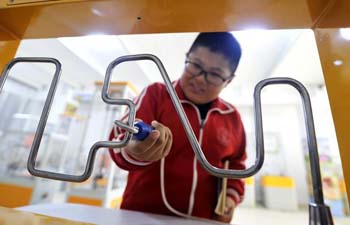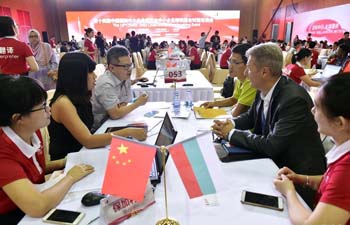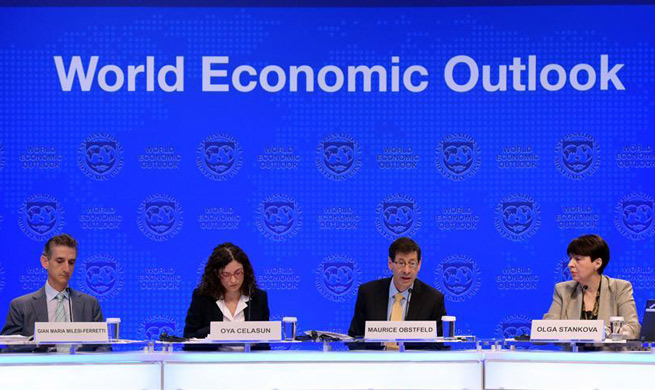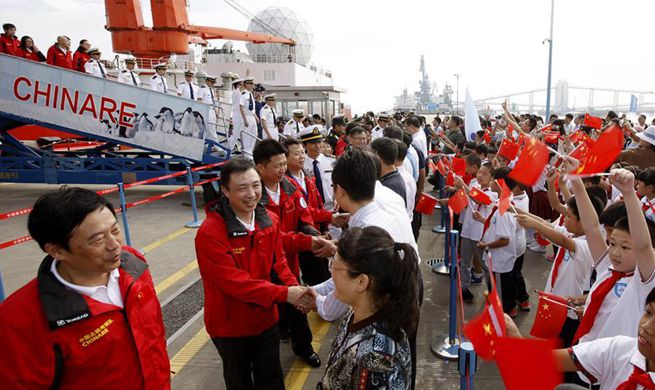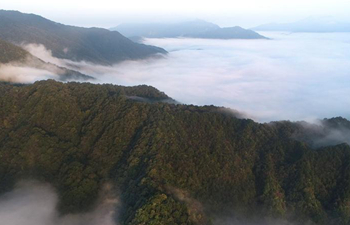DAMASCUS, Oct. 10 (Xinhua) -- As a political solution in Syria seems close, the government has already started securing economic deals for the reconstruction process in the war-torn country.
For now, the Syrian government seems to concentrate on making economic deals with its main international ally, Russia.
In the Russian Black Sea resort city of Sochi, a government delegation headed by Foreign Minister Walid al-Moallem took part in the plenary session of the Syrian-Russian joint Committee for Economic, Trade, Scientific and Technical Cooperation and signed protocols of economic cooperation for the implementation of projects in Syria.
Al-Moallem said Tuesday the meetings in Sochi have built a solid base for strategic cooperation in the economic field between both countries, according to state news agency SANA.
"We are getting closer, through cooperation with you (Russia) and with the rest of our allies, to final victory," said al-Moallem during his meeting with Russian Deputy Prime Minister Dmitry Rogozin.
He went on saying that "it is normal that we fight together our battle of building the Syrian economy," stressing that both sides have been able, at the end of the Joint Committee, to "build a strategic base for the economic building between us."
The head of the Syria diplomacy, meanwhile, noted that he is "not worried about the speed of implementing what we have agreed on," adding that the faster the Russian companies meet their obligations, the faster the Syrian economy recovers, "and the more assured you will be about your investments in the Syrian economy being remunerative."
For his part, Rogozin said that the Russian companies will commence their work in the reconstruction process in Syria, following reaching specific agreements.
In a statement to journalists following the signature ceremony, al-Moallem said that the agreements included strategic projects that will be "immediately implemented" in addition to other projects to be carried out within specific timelines outlined in the agreements.
Meanwhile, Minister of Petroleum Ali Ghanem, who was part of the government delegation to Sochi, announced the signature of several memos of understanding with Russia on cooperation in the oil sector, adding that the Syrian side held a number of effective meetings with Russian companies operating in this field, according to SANA.
He underlined the ministry's efforts to rehabilitate facilities damaged by the war, stressing that the oil sector has been subjected to systematic attacks by terrorists and the U.S.-led coalition alike, resulting in economic losses estimated at 68 billion U.S. dollars.
For his part, Ali Hammoud, the minister of transportation, said his ministry signed with Russia several agreements, including a project to link the coastal region in Syria with phosphate mines in the central province of Homs to transport 10 million tons of phosphate annually through the sea.
Electricity Minister Mohammad Kharboutli also stated that his ministry signed a protocol with the Russian side to complete the implementation of four strategic power generation projects that will be established in four different areas in Syria.
A day earlier, the Ministry of Economy announced launching a "regular maritime link" between the port of the coastal city of Latakia and the Novorossiysk seaport in Russia.
The cargo ships would sail from Latakia to Mersin in Turkey, Odessa in Ukraine all the way to Novorssiysk in a trip that would take seven days.
Mahdi al-Dali, the general director of the local production committee, was cited by SANA as saying that the importance of the maritime link is to ensure a fast transportation of goods, most importantly the agricultural ones to preserve their quality and validity.
Al-Dali noted that opening the new sea line is part of the government's efforts to open new markets for exportation in order to alleviate the hardships resulted from the Westerns sanctions on Syria.
Experts in Syria believe that when the war is over, Syria is expected to be the main attraction of foreign companies, and governments, particularly those interested in the reconstruction process.
Foreign investments will also play a role in shoring up the sluggish economy in Syria, which took a heavy beating during the war.
After six years of war in Syria, the country's economy has become crippled with the wide-ranging U.S. and European sanctions against Bashar al-Assad's government.
The total economic losses so far are calculated at about 226 billion dollars, "about four times the Syrian GDP in 2010," according to estimates published by the World Bank last month.
The effects will be felt for decades, as it's estimated that it would take 10 to 15 years for Syria's per capita GDP to return to pre-war levels.






